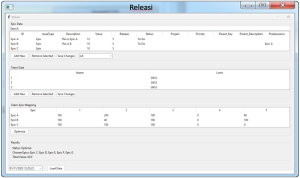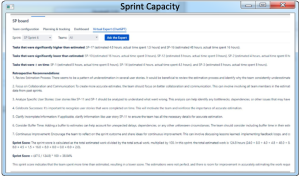In the era of digital transformation, project managers are increasingly turning to Artificial Intelligence (AI) to streamline workflows, optimize resource allocation, and enhance decision-making processes. AI’s intervention in project management is not just a futuristic concept but a present-day strategic advantage that is reshaping how projects are planned, executed, and delivered. Let’s delve into the transformative capabilities of AI in project management.
Elevating Release Planning with AI: Beyond the Queue System
As project scopes expand and releases grow more complex, the traditional first-come, first-served approach to release planning becomes increasingly inadequate. This method, while straightforward, often fails to capitalize on the strategic alignment of release items with business objectives, leading to suboptimal value delivery. In contrast, AI-driven tools like ReleasI are transforming this landscape, offering a more nuanced and value-focused approach.
ReleasI leverages sophisticated AI algorithms to prioritize release items not by their arrival in the queue but by their impact and alignment with the overall business goals. It comprehensively analyzes factors such as the expected value of each Epic, resource availability, dependencies, and market trends to generate a release plan that promises maximum value right from the outset.
This AI-centric approach to release planning ensures that the most critical and high-impact features are developed and deployed first, providing immediate benefits to the user base and stakeholders. It’s a methodical and strategic departure from the traditional queue system, circumventing the pitfalls of an order that may inadvertently delay essential features or capabilities.
By integrating AI into release planning, project managers are equipped to craft plans that are not only efficient but also inherently value-driven. ReleasI becomes an indispensable tool in the project manager’s arsenal, handling the complexities of modern release cycles with an intelligence and adaptability that human planning alone cannot match. The result is a release sequence that is logical, strategic, and tailored to deliver the best possible outcomes for the business, ensuring that every release is a step forward in fulfilling the organization’s vision and customer expectations.

Refining Risk Management with AI: Uncovering Unseen Issues
The real power of AI in risk management lies in its unparalleled ability to process vast amounts of data, discern patterns, and identify risks that may go unnoticed by even the most vigilant project managers. Unlike humans, who might focus on known risk factors, AI can analyze the entire spectrum of project data—including historical performance (baseline data), shifts in estimations, and timeline adjustments—to identify potential risks proactively.
AI tools can be configured to emulate the analytical prowess of an experienced project manager, constantly scanning for deviations that could signify trouble ahead. It acts as a relentless sentinel, updating risk assessments in real time as new data comes in, ensuring that the project team is not blindsided by emerging issues.
Importantly, AI’s objective analysis transcends human limitations by being agnostic to predefined issues. It does not succumb to confirmation bias or tunnel vision; it assesses the data as it is, offering an unbiased evaluation of risk factors. This can range from flagging inconsistencies in performance against timelines to detecting subtle shifts in resource allocation that could signal a bottleneck.
By integrating AI in risk management, project teams can receive specific recommendations on how to mitigate identified issues. These AI-generated strategies are grounded in data, drawing from a wealth of historical insights and current trends to provide tailored solutions. This level of specificity and adaptability in risk mitigation not only enhances project resilience but also empowers teams with actionable intelligence to navigate complex project landscapes effectively.
Revolutionizing Sprint Analysis with AI Integration
Incorporating AI into the sprint analysis phase transcends traditional capabilities, ushering in an era where estimations and planning are significantly refined. Often, technical teams may excel in execution but falter in the meticulous planning and estimation stages, which are critical to Agile methodologies. AI steps in to fill these gaps, offering predictive analytics that enhance the accuracy of sprint planning.
With AI’s assistance, project managers can obtain a more nuanced understanding of task durations and dependencies. AI algorithms excel at parsing historical data and current team performance metrics to forecast timelines with remarkable precision. This advanced estimation capability allows for more reliable and attainable sprint goals, tailored to the team’s verified capabilities and past performance trends.
Moreover, the integration of AI in sprint cycles does more than enhance planning; it shifts the team dynamic towards a more objective and data-driven culture. By removing the subjective elements often associated with estimation and planning, such as guesswork or unfounded optimism, AI introduces a level of impartiality to the process. This impartiality helps to mitigate undue judgment or blame when sprints face challenges, fostering a more collaborative and accountable environment.
The impartial insights provided by AI can also guide the team in understanding their performance without personal bias or emotional influence. This clear-eyed analysis encourages a constructive response to sprint reviews and retrospectives, as team members focus on data-led strategies for improvement rather than defending subjective perspectives. As a result, AI doesn’t just enhance the technical aspects of project management—it helps cultivate a more cohesive and accountable team ethos, pivotal for sustained Agile success.

Transforming KPI Analysis with AI: From Rigid Dashboards to Dynamic Insights
The transition towards AI in project management marks the end of a rigid, bottom-up approach to KPIs where managers had to conform to standard dashboards and pre-defined metrics. Historically, the burden of complex Business Intelligence (BI) tasks, such as scripting intricate SQL queries, made it impractical to pursue nuanced KPIs without substantial investment. Managers were often constrained to what was readily measurable, rather than what was most insightful.
AI engines today signal a paradigm shift, offering the ability to not just measure, but also to understand and predict complex project dynamics through sophisticated analysis. They can effortlessly respond to high-level managerial queries, providing rich, context-aware insights. Managers can now ask AI-powered systems intricate questions like, “How long does it take to develop a typical feature?” or “What is the projected plan versus actual rate based on the current status?”
The intelligence of these systems lies in their capacity to calculate the quality of a release by analyzing defects rate, the number of reworks, and the plan versus actual time rate for each ticket. This is achieved not through exhaustive BI configurations but by presenting the AI with a question as a prompt. The AI then autonomously sifts through data, employing deep learning algorithms to derive accurate, actionable KPIs.
This sophisticated approach eradicates the need for complex rule definitions and database querying traditionally involved in BI efforts. Instead, it empowers managers with the agility to seek precise information tailored to their immediate needs, fostering a transparent, informed, and proactive project environment. AI’s capability to provide dynamic KPIs ensures that project management is not just about tracking progress but also about gaining strategic insights that drive decisions and enhance performance.
Conclusion
As project management continues to evolve, AI stands as a formidable ally, empowering project managers to navigate the complexities of modern projects with greater ease and precision. From meticulous planning to real-time risk assessment and from sprint optimization to effortless KPI generation, AI is revolutionizing the project management landscape. Embracing these AI advancements not only propels projects towards success but also positions project managers at the forefront of innovation, ready to steer their teams through the challenges of a rapidly changing world.
To explore how you can implement AI technology within your systems and harness its full potential for your project management needs, please reach out to us at [email protected]
We’re here to guide you through every step of the integration process.





